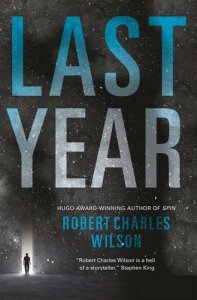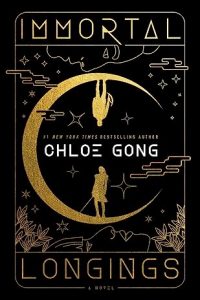Paul Di Filippo reviews Robert Charles Wilson
 Last Year, by Robert Charles Wilson (Tor 978-0-7653-3263-9, $27.99, 352pp, hardcover) 6 December 2016)
Last Year, by Robert Charles Wilson (Tor 978-0-7653-3263-9, $27.99, 352pp, hardcover) 6 December 2016)
Somehow, thanks to the depth of his literary talents, fecund inventiveness, and empathetic soul, Robert Charles Wilson has crafted a novel that is at once shiny and futuristic and yet rousingly old-fashioned, considering its ambiance and character development, done up in the manner of a classic pre-modern adventure. This hybrid becomes an organic whole, eminently satisfying on both science-fictional and naturalistic levels. And this understated yet truly dramatic book proves that one need not indulge in pyrotechnics nor abstruse far-edge-of-science ideas to deliver a story that fully justifies the SF label and mission.
The year of our saga is 1876, the place Illinois—specifically, the “City of Futurity.” This settlement, out in the middle of nowhere, has been built by time travelers who derive—judging by certain cultural touchstones they maintain—from roughly our own era. (But as we shall see, not necessarily the twenty-teens of our canonical history.)
The City has been constructed around a time-gate dubbed the “Mirror” for two purposes. Time-tourists from the future come back for excursions into the “exotic” world of 1876, while natives of 1876 get to experience a tiny bit of the mystifying future, through exposure to various exhibits and by staying at the City’s recreational facilities. The whole enterprise is run by one August Kemp, a hard-nosed but not evil businessman from the upstream end.
The City hires locals, and one such is our hero, Jesse Cullum. A big bruiser, far from unintelligent, Jesse acts as security for the theme park and does other odd jobs such as perimeter patrol. He lives in the part of the City reserved for his kind.
One day President Grant comes visiting, is targeted by an assassin, and is saved by Jesse’s calm heroics. This brings Jesse to the attention of Kemp, who gives him a new assignment at higher pay. He is to team up with Elizabeth DePaul—tough future-born gal, a military vet—and track down the leak that is allowing future weaponry to infiltrate the past. (Shades of Turtledove’s The Guns of the South.)
Jesse and Elizabeth start their detective work together in a kind of prickly manner, two people from, essentially, totally different and antithetical cultures and “countries.” But as they track down one lead after another, both in the City and in the 1876 milieu, they soon become friends and lovers. Yet when Elizabeth is sent back to the future, their affair seems over. It is not, however. She returns, hooks up again with Jesse—who has been chasing down “runners,” future tourists who try to go native—and together they will undertake one last assignment that will involve much blood, sacrifice, disobedience to authority, and an investigation into the true nature of their affections.
The dominant pleasures of this book—and there are many subsidiary ones—derive from Wilson’s brilliant exfoliation and habitation of Jesse’s mind and nature. The vast majority of the book is funneled through his absolutely authentic nineteenth-century perceptions—although we do get a rare divergence into Elizabeth’s point of view, and that of a couple of others. And the personality with which Wilson has endowed Jesse is both amiable and wary; whole-hearted and damaged; open yet suspicious, a mix of qualities fully justified by Jesse’s backstory, which is doled out in a natural-seeming manner as he and Elizabeth come to know each other better. And the fact that Jesse’s life history ends up driving the plot of the novel at the end is an elegant capstone.
In Elizabeth—an almost equally dominant, multiplex and resonant creation of Wilson’s—Jesse finds the perfect sounding board and foil for his own passions and hurts, ambitions and fears. The dialogue between them—Elizabeth foul-mouthed, cynical and postmodern, Jesse circumspect, idealistic and Victorian—is entertaining as heck. Yet Jesse never comes off as a hick, nor Elizabeth as an impossible warrior woman.
So the doings of these two, both romantic and professional, set wholly in the past (we never see the upstream end of the linkage) constitute a kind of classic detective-novel-cum-thriller along the lines of something Conan Doyle or John Buchan or Eugene Sue might have written.
But of course Wilson layers in the solid speculative elements as well. The peculiar nature of his time-travel device—“material translations in ontological Hilbert space”—as well as the culture clashes (and the question of which, if either, civilization is superior, which inferior?), and the humorous “Mozart in mirrorshades” riffs of the inter-era mixing (Jesse becomes a big fan of Jimi Hendrix’s music) all receive an intelligent and surprising workout that complements and supplements the main story.
By setting his tale totally in the past—unlike, say, the recent and somewhat allied Wesley Chu novel Time Salvager, which used the skipping-around-among-eras method deployed by other classics of this sub-genre, such as those by Silverberg, Willis and Baker—Wilson achieves the kind of solidity of portraiture—of time and character—these others do not necessarily evoke.
The infamous advertisement by the Science Fiction Book Club for Asimov’s The End of Eternity—“You travelled through time to taste forbidden love…but now you must murder her!”—might be rephrased here as “She travelled through time to taste forbidden murder…and now you must love her!”
All silliness aside, this fine novel offers a solid superstructure of adventure, romance, humor and tragedy whose essential foundation is the enticing weirdness of cosmic principles remade “nearer to the heart’s desire.”





